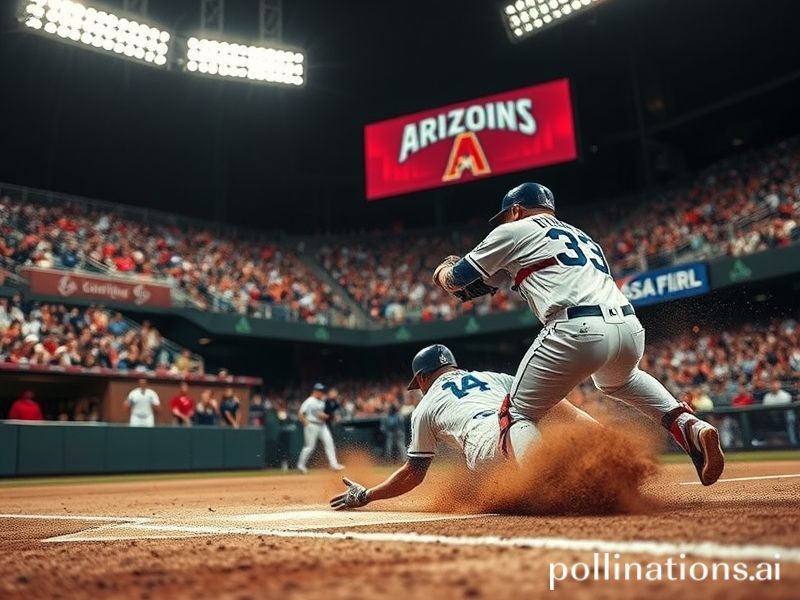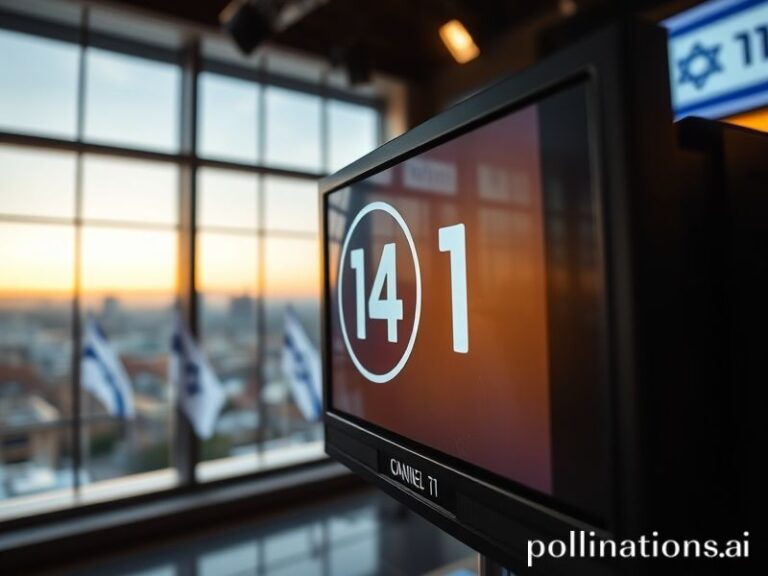Dodgers vs. D-Backs: How a Desert Baseball Game Became a Global Economic Weather Vane
Dodgers-Diamondbacks: When a Desert Dust-Up Becomes a Geopolitical Barometer
By “Marco Polo with Wi-Fi,” Dave’s Locker International Desk
LOS ANGELES—Somewhere between the traffic snarl on the 101 and the Pacific’s cold shoulder, two baseball clubs played a game last night that, on paper, was merely the Los Angeles Dodgers hosting the Arizona Diamondbacks. On the cosmic ledger, however, it was another installment in humanity’s tireless effort to find meaning in nine innings while the planet quietly files for Chapter 11.
For the uninitiated, the Dodgers are the sporting equivalent of a Silicon Valley unicorn: overvalued, overexposed, and yet annoyingly good at producing returns. The Diamondbacks, meanwhile, are the hedge-fund manager’s guilty pleasure—an expansion franchise from 1998 that still behaves like it’s on probation, forever one late-night tequila decision away from trading its entire outfield for a packet of magic beans.
But let’s zoom out. The game was broadcast live in 182 countries, which means a yak herder in Mongolia could watch Mookie Betts turn on a 97-mph fastball at the exact moment his own government was rationing electricity. Globalization’s great triumph: shared poverty, shared bandwidth, shared strike-zone graphics. The broadcast rights alone paid for a modest fleet of Gulfstreams—those carbon footprints conveniently omitted from the nightly highlight reels.
Across the Atlantic, European insomniacs caught the 4 a.m. replay, mistaking the stadium’s empty-orange seats for a California brushfire. They weren’t entirely wrong; Los Angeles County has been on actual fire so often that fans now instinctively sniff for smoke before booing a blown save. Climate change has become the league’s unofficial mascot: every foul ball a meteorological omen, every seventh-inning stretch a brief reprieve to apply SPF 2000.
In Asia, the game arrived during lunch breaks in Seoul and late-night ramen sessions in Tokyo. South Korean fans compared Shohei Ohtani’s exit velocity to their own K-pop idols’ chart velocity, while Japanese viewers quietly calculated how many more industrial robots could be purchased with Ohtani’s next contract. Both nations filed the data under “soft power”; Washington filed it under “trade imbalance.”
The Middle East, ever the pragmatist, streamed the game on delay—fast-forwarding through pitching changes the way one skips dialogue in a soap opera. When asked why baseball matters in a region where cricket reigns supreme, a Dubai financier shrugged: “Same reason we buy English football clubs. Diversification.” Indeed, sovereign wealth funds now treat MLB highlight packages the way they once treated oil futures: volatile, flashy, and best enjoyed with a discreet NDA.
Back in Phoenix, the Diamondbacks’ loss dropped them further behind in the National League West, a division so top-heavy it could double as a metaphor for global wealth distribution. The Dodgers, payroll bloated to roughly the GDP of Tonga, cruised to another victory, prompting the usual think-pieces about competitive imbalance. Curiously, no one compared the luxury-tax threshold to offshore tax havens. Probably ran out of column inches next to the cryptocurrency ads.
And then there were the fans—those brave souls who paid $17 for a beer that tastes like carbonated regret. They came seeking communal catharsis, a three-hour hiatus from the algorithmic doom-scroll. Instead, they got a seventh-inning rendition of “God Bless America” while facial-recognition cameras quietly logged their cheekbones for future marketing campaigns. Freedom, like a hanging curveball, is best enjoyed before it breaks.
What does it all mean? Perhaps nothing. Perhaps everything. Two teams, 26 outs, and an infinite capacity for humans to project geopolitics onto a leather sphere. The final score—Dodgers 6, Diamondbacks 2—will be forgotten by October. But the satellite images, the data packets, the carbon emissions, and the offshore bets will linger like the smell of Dodger Dogs and existential dread.
So while the yak herder switches off his solar-powered radio, and the Tokyo analyst closes the spreadsheet, the game recedes into the archives, another pixel in the global mosaic of distraction. Tomorrow the planet will still be on fire, the rich will still get richer, and the Diamondbacks will still be the Diamondbacks. Baseball, bless its anachronistic heart, just keeps throwing the next pitch—because stopping would mean looking up, and nobody’s quite ready for that.







